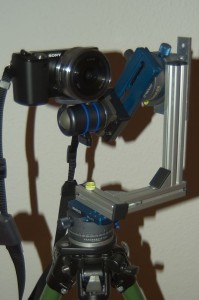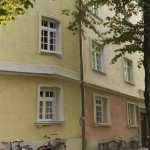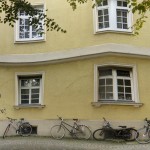This post also deals with the answer to Huck’s question whether it is possible to make a full spherical panorama from sweep panoramas made with the Sony NEX-5:
The camera can pan vertically 185 degrees. It can catch the nadir and zenith. It would have more than 45 degrees horizontally so about 5 shots should get you everything. If these could be stitched you could have a spherical panorama with 5 shots. Have you ever tried this? Do you know if it could be done?
As an introduction to the subject please read my answers to Huck’s question here before you continue.

I mounted the camera on a weird looking panorama head. The setup may not have been perfect in the NPP, but good enough because there were no objects near the setup. I switched the camera to the panorama mode “Vertical Up” in “Wide” mode. One resulting sweep panorama has 2160×5536 pixels. To get enough overlap I took eight of them, starting from the bottom to the top. I locked the exposure for every stripe around the horizon by pressing down the shutter half way. The finished panorama was about 12000×6000 pixels in size.
Here is the best result I could achieve with the source material. You find my PTGui project for the panorama for starting your own stitching experiments here.
[pano file=”https://www.panotwins.de/wp-content/panos/MMatern_20101008_1188_PanoramaSmall.xml” preview=”https://www.panotwins.de/wp-content/panos/MMatern_20101008_1188_PanoramaSmall.jpg”]
 Show on map
Show on map
The result may not look that bad at first sight, but when looking closer you will see heavy distorted parts (due to the really weird a, b and c parameters from the optimizer) and moving poeple cut in parts:
To make a long story short: The poor result does not warrant the huge effort!
I got a much better result taking individual shots from the panorama head. With the 16mm pancake lens in portrait mode you can make a complete sphere with a final size of about 20000×10000 pixel: You need three rows: 6 shots tilted 60° up, 8 shots at the horizon and again 6 shots tilted 50° down. This closes the hole at the zenith and leaves one at the nadir. However this can easily be fixed by removing the tripod and making a down shot using the view point correction technique described here or here.
When you download the sample sweep panoramas and try it for yourself, please let me know when you were able to stitch a better result from the source material. And what’s most important: Try to describe the process in detail!



Watching the panorama made me laugh. If I didn’t know the panorama was distorted I would have thought these were some strange (and maybe even creative) buildings.
Why making thing easy when we can make thing complicated ? 😉